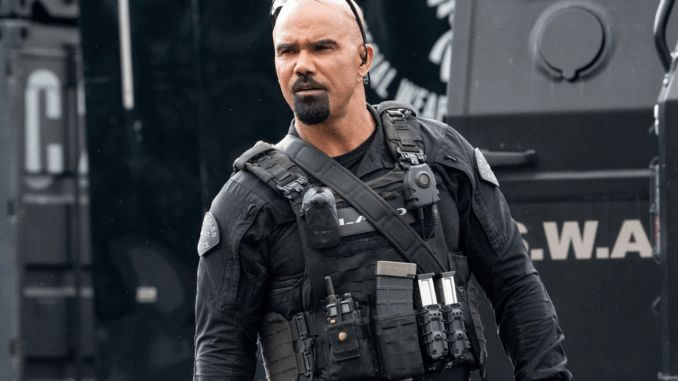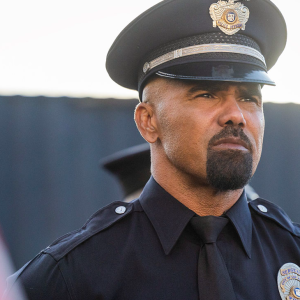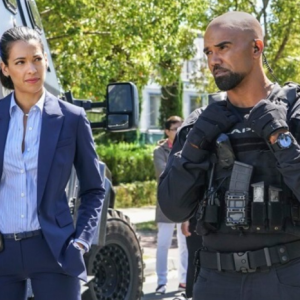In 2023, fans of the CBS procedural drama S.W.A.T. were rocked by news of its cancellation – for the third time in the show’s history. Despite consistently strong ratings, a diverse and beloved ensemble cast, and a fiercely passionate fanbase, the network made the perplexing decision to pull the plug, sparking immediate outrage and a public battle that few television shows ever experience. This time, however, leading man Shemar Moore was not going to let the decision stand quietly.
The core reasons cited for S.W.A.T.’s initial cancellation revolved primarily around complex financial and strategic considerations, rather than the show’s performance. First and foremost were the escalating “budget battles” between CBS, the network that airs the show, and Sony Pictures Television, the studio that produces it. As a co-production, the series involved intricate financial negotiations for each season, encompassing licensing fees, profit-sharing agreements, and distribution rights. Industry insiders revealed that contract talks had grown increasingly contentious, with CBS pushing aggressively for significant reductions in production costs. Sony, however, was reportedly unwilling to drastically slash the budget, recognizing the high quality of the show’s production and its value as an asset. This impasse over financial terms became a major stumbling block in renewal discussions, illustrating how money, rather than viewership or critical acclaim, often dictates a show’s fate.
Beyond the co-production disagreements, S.W.A.T. faced rising internal production costs. By its seventh season, the show boasted a large, established ensemble cast whose salaries naturally increased over time. Furthermore, its hallmark was high-octane action sequences, which necessitated extensive stunt teams, intricate special effects, specialized equipment, and frequent on-location shoots across various parts of Los Angeles and sometimes beyond. These elements, while essential to the show’s appeal and fidelity to its subject matter, made it one of CBS’s more expensive scripted dramas, even when it consistently delivered solid viewership numbers. In a landscape increasingly driven by cost-efficiency, S.W.A.T.’s production demands became a significant disadvantage in the eyes of network executives.

Adding to these financial pressures were CBS’s evolving scheduling priorities and broader programming shifts. The network has shown a clear strategic leaning towards multi-camera sitcoms, unscripted reality shows, and the expansion of its highly successful crime procedural franchises like NCIS and FBI. These types of programming often come with lower production costs and higher profit margins, making them more attractive investments. With new shows constantly in development, CBS needed to free up prime-time slots, and unfortunately, S.W.A.T., despite its loyal following, became a casualty of this strategic reshuffle.
Finally, viewer demographics and advertising models played an unfair role in the show’s precarious position. While S.W.A.T. regularly pulled decent numbers, frequently dominating its Friday-night competition, its core audience tended to skew slightly older. Networks, and by extension, their advertisers, typically prefer younger demographics (18-49) due to their perceived greater spending power and desirability for product promotion. This preference, though often arbitrary in its application, can significantly hurt a show’s renewal odds, regardless of its overall viewership success or quality.
However, these corporate justifications were met with fierce resistance, primarily from the show’s impassioned lead, Shemar Moore. In a now-viral Instagram video, Moore didn’t mince words, directly challenging CBS’s decision. He emphatically stated, “Did you know that we are the most-watched show on Friday nights? Did you know we’ve been killing it in the ratings? And they still canceled us?” He publicly labeled the network’s choice as “a mistake,” “shortsighted,” and profoundly “disrespectful” to the dedicated cast, crew, and millions of loyal fans who had invested years in the series.

Moore’s disagreement extended beyond mere ratings. As the only Black lead on a major CBS procedural, he consistently championed the importance of diverse leads and authentic representation on television. He viewed the cancellation not just as a business decision, but as part of a larger, systemic issue within the industry regarding how diverse voices and stories are valued. “This is bigger than me,” he asserted, “This is about representation. About doing things the right way.” Moore also revealed that he was blindsided by the sudden decision, having been led to believe a renewal was likely before silence, and then the abrupt cancellation, descended. He criticized the process as unfair, arguing that “You don’t treat people who’ve carried your network like this.”
The S.W.A.T. fandom proved itself to be one of television’s most devoted, immediately mobilizing upon the cancellation announcement. Hashtags like SaveSWAT and ShemarDeservesBetter trended widely across social media platforms, transforming online frustration into a tangible, unified voice. Shemar Moore powerfully amplified this fan outcry, reposting countless fan campaigns and personally thanking viewers for their relentless fight to bring the show back. This collective pressure from both the show’s star and its dedicated audience proved to be an undeniable force.
Remarkably, due to the sheer volume of fan pressure and Shemar Moore’s very public and passionate advocacy, CBS made a shocking reversal within a week. S.W.A.T. was renewed, but with a significant catch: it would be for a shortened Season 7, comprising only 13 episodes, and explicitly touted as the “final season.” This felt less like a genuine comeback and more like a consolation prize, leaving the door open for very little, if any, future beyond those final episodes. The terms hinted at a reluctant concession rather than a full commitment.

Following the conclusion of Season 7, reports surfaced of a potential spin-off centered around Shemar Moore’s character, Hondo. While Moore himself was reportedly excited by the prospect, the news largely divided the existing fanbase. Many fans voiced concern that a spin-off would lack the fundamental elements that made the original show so compelling: the tight-knit ensemble dynamics, the chemistry of the full original team (including characters like Deacon, Tan, Luca, and Chris), and the collaborative spirit that defined the squad. They feared a more serialized, character-focused tone might “miss the soul of the show,” as some former cast members reportedly echoed. The desire was for the S.W.A.T. family, not just one member.
Despite all the behind-the-scenes drama and the “final season” designation, a flicker of hope for S.W.A.T.’s true return continues to burn. Rumors of a potential Season 9 have been circulating, fueled by the unwavering fan demand, the lukewarm reception of the spin-off concept, and Shemar Moore’s persistent advocacy for the show’s survival. Furthermore, the burgeoning streaming landscape offers a new avenue, with whispers of Netflix, Amazon, or Hulu showing interest in acquiring the franchise. Moore has openly courted these platforms, stating, “If Netflix is listening, or Amazon, or Hulu — we’d love to come play.”
In an era grappling with complex issues like police reform, glaring representation gaps in media, burgeoning mental health awareness, and the ongoing challenges faced by veterans, S.W.A.T. distinguished itself by offering a rare blend of thrilling action sequences grounded in profound real-world relevance. Hondo’s character, beyond being a compelling hero, stood as a symbol of progress, accountability, and the nuanced complexities of modern law enforcement. The show tackled these difficult subjects with a thoughtfulness often missing in network procedurals, giving it an enduring cultural significance.

What the fans desire is clear: a proper, full-length final season that allows the entire original cast to return, ensuring all existing storylines are wrapped up with the care and respect they deserve. They are largely resistant to spin-offs that exclude the core squad. Or, even better, many hope for a full revival, done the right way, with Shemar Moore, David Lim (Tan), Kenny Johnson (Luca), Alex Russell (Jim Street), Jay Harrington (Deacon), and the true heart of S.W.A.T. intact.
Ultimately, S.W.A.T. did not face cancellation because of poor storytelling or diminishing quality. It was sacrificed on the altar of budget cuts, complex boardroom politics, and shifting corporate priorities. Yet, Shemar Moore, the dedicated cast and crew, and millions of fans around the world have refused to let it fade into quiet oblivion. Moore’s boldness, transparency, and his refusal to sugarcoat the truth have made one thing unequivocally clear: S.W.A.T. was never just a show. It became a movement, a beacon of representation, and a testament to the power of a passionate fanbase. And perhaps, just maybe, this movement has not yet reached its conclusion.





